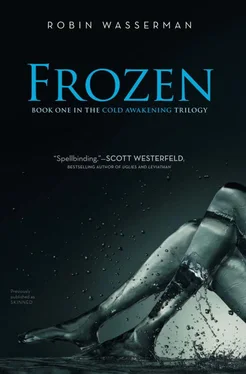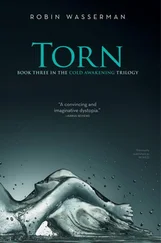“What did you do to me?”
Dr. Handsome shot the uglier guy a look that made me realize who was really in charge. And he was the one who finally answered. “We saved your life.”
“What did you do?”
No one spoke.
My mother lifted her head from my father’s shoulder. She looked me in the eye. Not the forehead, the eye. She wasn’t crying anymore. “You know about BioMax,” she said. “You remember.”
I knew just about as much as I cared. Which was very little. BioMax, some biotech subsidiary of my father’s corporation, hyped on the vids the year before with some freaky new tech that—
“No.”
I knew.
“We had to,” my mother pleaded. “We didn’t have any other choice.”
“No.”
“Honey, you heard the doctors, you were going to die . This was the only way.”
“No.”
“Lia.” My father balled up his fists, shoved them into his pockets. “Yes.”
“We held off for as long as we could,” the pretty doctor said. I felt like he was leering at me, like I was some mechanical puzzle he was desperate to take apart, then try to put back together. Except he’d already done so. “Dr. Dreyson”—he jerked his head toward his troll-like partner—“had you on the table for seventeen hours before we made the decision.”
“Before you gave up.”
“We would never give up on you,” my mother said.
My father frowned. “That’s why you’re still here.”
But I wasn’t.
I was a ghost in the machine.
A mech-head.
A Frankenstein.
A skinner.
“The download process was a complete success,” Dr. Handsome said. “Your brain came through the accident completely intact, and we were able to make a full transfer. The body is, I’m afraid, not the customized unit you might have selected under less critical circumstances, but we did our best to choose a model that would emulate your baseline specs, height, weight, coloring.”
He was talking like I was a new car.
Everyone knew about the download freaks, or at least, we knew they were out there, computer brains stuffed into homemade bodies, walking around looking like real, live people. Sort of. The first few were all over the vids for a while, until they got boring and people moved on to something else just as irrelevant, like betting on how long it would be before the president went AWOL from rehab again.
“You turned me into a skinner.”
Dr. Troll wrinkled his big nose. “We prefer not to use that word.”
But that’s what they were called, because that’s what they did.
Skinners. Computers— machines —that hijacked human identities, clothing themselves in human skin. Except the flesh was just as artificial as what lay beneath. A skinner was nothing more than a computer that wore a human mask, hiding wiring and circuitry underneath a costume of synthetic flesh. A mechanical brain, duped into thinking it was real.
Or, in this case: a mechanical brain duped into thinking it was Lia Kahn.
“You are Lia,” the repulsively handsome one said. “All your memories, all your experiences, everything you are was simply transferred to a more durable casing. Just like copying a file. Nothing more mysterious than that.”
“Put me back.”
“Lia…” My mother pressed her eyes closed with her left hand, massaging the lids.
“Once we train the neural network to accommodate itself to its new physical surroundings, you should be able to pick things up right where you left off.” Dr. Handsome was unstoppable. “You’ll see we’ve done remarkable things with sensation, motion… Of course there are things to get used to, but many of our clients have found life postdownload nearly indistinguishable from their experiences before the procedure. And quality of life will certainly be far superior to anything you would have experienced with your degree of injuries—”
“Put me back the way I was. I don’t care about the injuries. I don’t care. Put me back.”
One leg, one arm, no skin, I didn’t care. As long as I was human. As long as I was me .
“It’s not possible.”
“Anything’s possible if you want it enough.”
Another of my father’s favorite slogans.
The doctor’s voice was cold. “There’s nothing to put back. There’s no body to go back to. The body of Lia Kahn is dead. Be grateful you didn’t die with it.”
And when I wouldn’t believe him, he offered to prove it. Wires were detached. Machines wheeled away. Two men—not doctors; the doctors never touched me—grabbed my sides. They hoisted me into a sitting position. My head lolled forward on my neck, and I saw my hands for the first time. They hung limp in my lap, fingers half curled, nails round and smooth; useless. Somebody else’s hands, resting on somebody else’s legs. The flesh was unnaturally smooth, just like the skin on the face. There were no creases and whorls, no subtle shifts of color or thready blue veins beneath the surface. I wondered if there were fingerprints.
One of the men grabbed me under the armpits and hoisted me off the bed. He looked like the type of guy who would have bad breath, and for a moment his mouth was close enough to mine that I could have smelled it, if I could have smelled anything. I was wearing a sleeveless paper-thin blue gown, loose around the armholes. His hands pressed bare skin, or whatever it was. He could probably see down the front of it if he’d wanted to. I didn’t care. It wasn’t my body under there. It was a thing. A thing I couldn’t feel and couldn’t move, a thing I was trapped inside. It wasn’t me.
He didn’t peek. Instead he dumped me into a high-backed wheelchair and fastened a belt around my waist. Then another around my forehead, pressing my head against the seat and fixing my eyes straight ahead. Through it all, he never looked at my face.
The pretty doctor, who got less attractive every time he spoke, told me to call him Ben. He wasn’t actually a doctor, he said. Which made sense. Doctors took care of people, right? Sick people, injured people. People. I wasn’t one of those, not anymore. Thanks to Ben . My mechanic.
Call-me-Ben wheeled me down a long corridor. I couldn’t feel the body, couldn’t feel the seat. It felt like I was floating through the hall, just a set of eyes, just a mind, just a ghost. My parents stayed behind. My mother said she couldn’t see it again. It, she said. My father didn’t say anything, but he stayed with her.
“We’ve kept it in cold storage for you,” Ben said from behind me. “Most clients request a viewing.”
It.
We wheeled into a narrow room, its white tiled walls lined by silver plates. Ben pressed his palm to one, and it slid out of the wall, revealing a long, metal panel bearing a sheet-covered lump. A body-shaped lump.
“You sure?” Ben asked, guiding the wheelchair into position. “This can be difficult.”
I couldn’t stand to hear the computer speak for me, not here. Not now.
I blinked once.
He began with the feet. Foot.
The flesh was red and ruined, gouged. Mottled with deep, black scabs. There were thick streaks of pearl white, as if the skin had calcified. Or maybe the flesh had been flayed and I was looking at bone. The knee was bent at the wrong angle; the other leg was gone, ending just below the thigh, swirls of dried blood and charred flesh winding around one another, like the rings of a severed tree stump.
The sheet drew farther back.
I wish I could say I didn’t recognize it, that it was some monstrous mound of skin and bones, broken and unidentifiable.
Читать дальше












